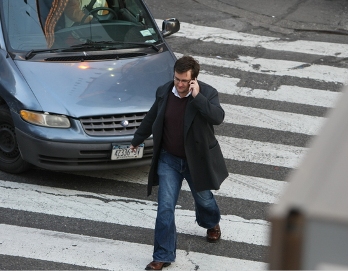There’s a scene at the beginning of the Albert Brooks comedy Defending Your Life in which our angst-ridden hero is celebrating his birthday with a brand new BMW. Putting his dream car through its paces with Barbara Streisand blaring over his stereo, he makes a tight turn and all his CD’s slide off the passenger seat. Leaning over to pick them up, he distracts himself right into a head-on collision with a bus.

I was thinking about that scene recently while I was waiting for a light to change at an intersection. A woman, talking on her cellphone, approaches the corner. I watch as two things happen: 1) she steps into the crosswalk seemingly unaware that the light has just changed, and 2) she continues her phone conversation while casually continuing to cross while the rest of us all wait.
The driver to my left is as frustrated as I am, but the driver to my right could care less. Why? He’s busy talking on his cellphone.
In the state of California, talking on a hand-held device while driving is an offense punishable by a fine of… are you sitting down… $20.
Since the advent of cell technology it amazes me how many people (certainly not all) have not only chosen the great outdoors as their personal phone booth, but somehow feel that the rest of us should accept any behavior that goes along with it. For some, it has clearly reached a breaking point.
Michael Arrington, who writes about technology for WashingtonPost.com, experienced his own moment of protest.
“I was driving to Google for a product briefing, minding my own business, talking on my phone…. I stopped at a crosswalk… And this guy… decides it’s time to take a stand against cellphone use in cars. So he stands in front of my car and won’t move… it was his Tiananmen Square moment.
“Cars behind me start swerving. I back up to go around him. He steps forward, vigilant in his defense of the law. I’m off the phone now… The light changes. The light changes again. Cars are now backed up behind me.
“I’m not sure what comes next in a situation like this. I can either drive over him or park my car. So I put the car in park, open the door to get out and discuss the situation with him. That’s when he ran away. His mission, apparently, accomplished.”
New York Times reporter Matt Richtel (Jan. 17) tells this story:
“…Tiffany Briggs, 25, was talking to her grandmother on her cellphone, lost in conversation. Very lost.
“‘I ran into a truck,’ Ms. Briggs said.
“It was parked in a driveway.
“Distracted driving has gained much attention lately because of the inflated crash risk posed by drivers using cellphones to talk and text. But there is another growing problem caused by lower-stakes multitasking — distracted walking.
“Slightly more than 1,000 pedestrians,” The Times says, “visited emergency rooms in 2008 because they got distracted and tripped, fell or ran into something while using a cellphone to talk or text. That was twice the number from 2007, which had nearly doubled from 2006, according to a study conducted by Ohio State University, which says it is the first to estimate such accidents.”
My first reaction to all of this: if your life is so scheduled-up that you need to have phone conversations while you’re walking in and around moving as well as inanimate objects, maybe you need to rethink your priorities. However, more to the point, the ethical value of caring asks us to be mindful of how our words and actions may affect others.
Perhaps the best solution comes in two simple yet sensible pieces of advice my grandmother used to tell me when I was younger.
“Always be considerate of others,” and, “When you reach a street corner, stop and look both ways before carefully crossing.”
Comments









